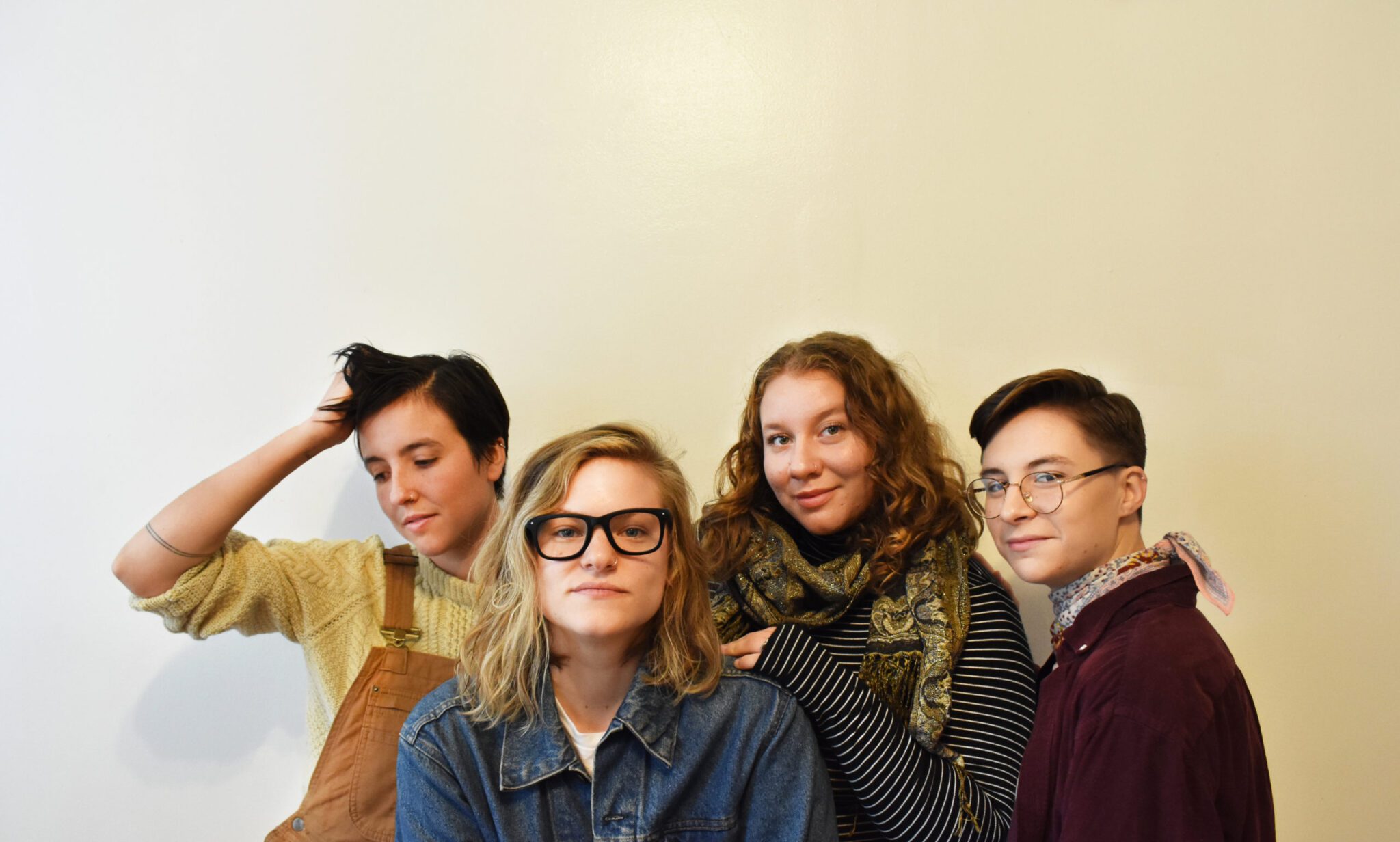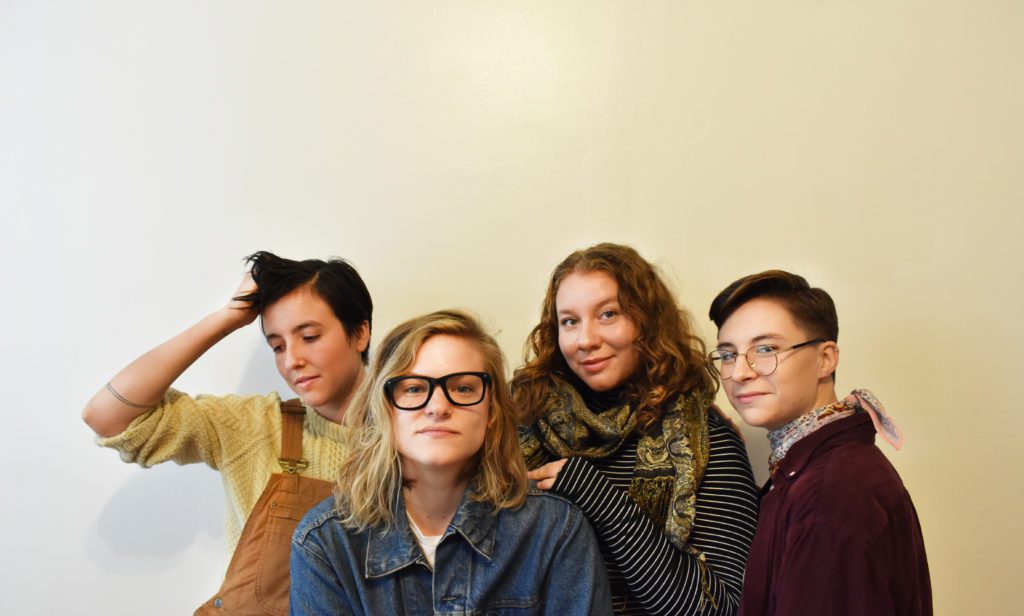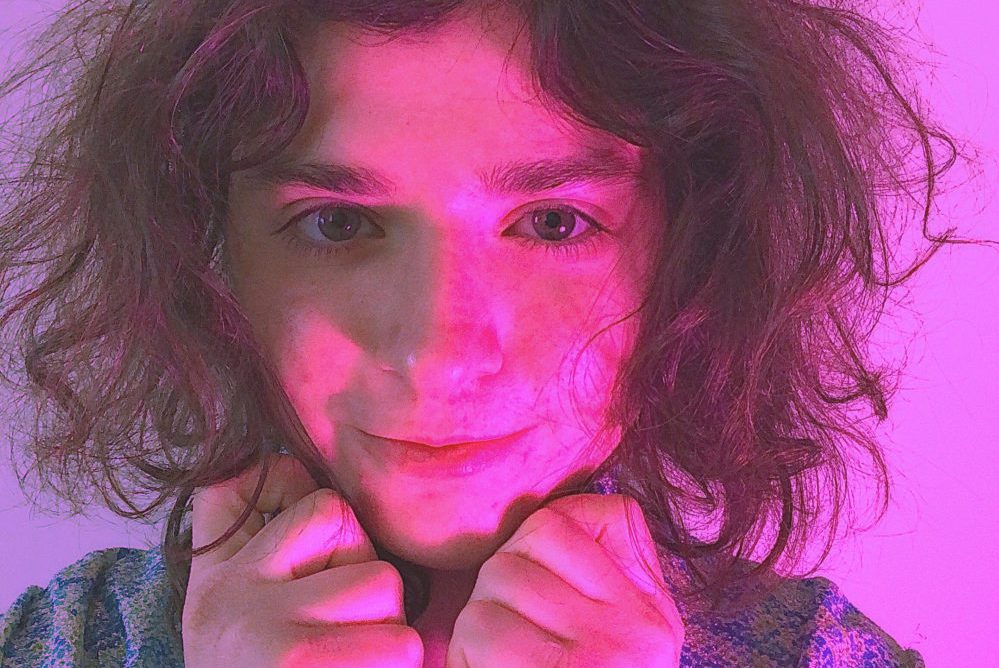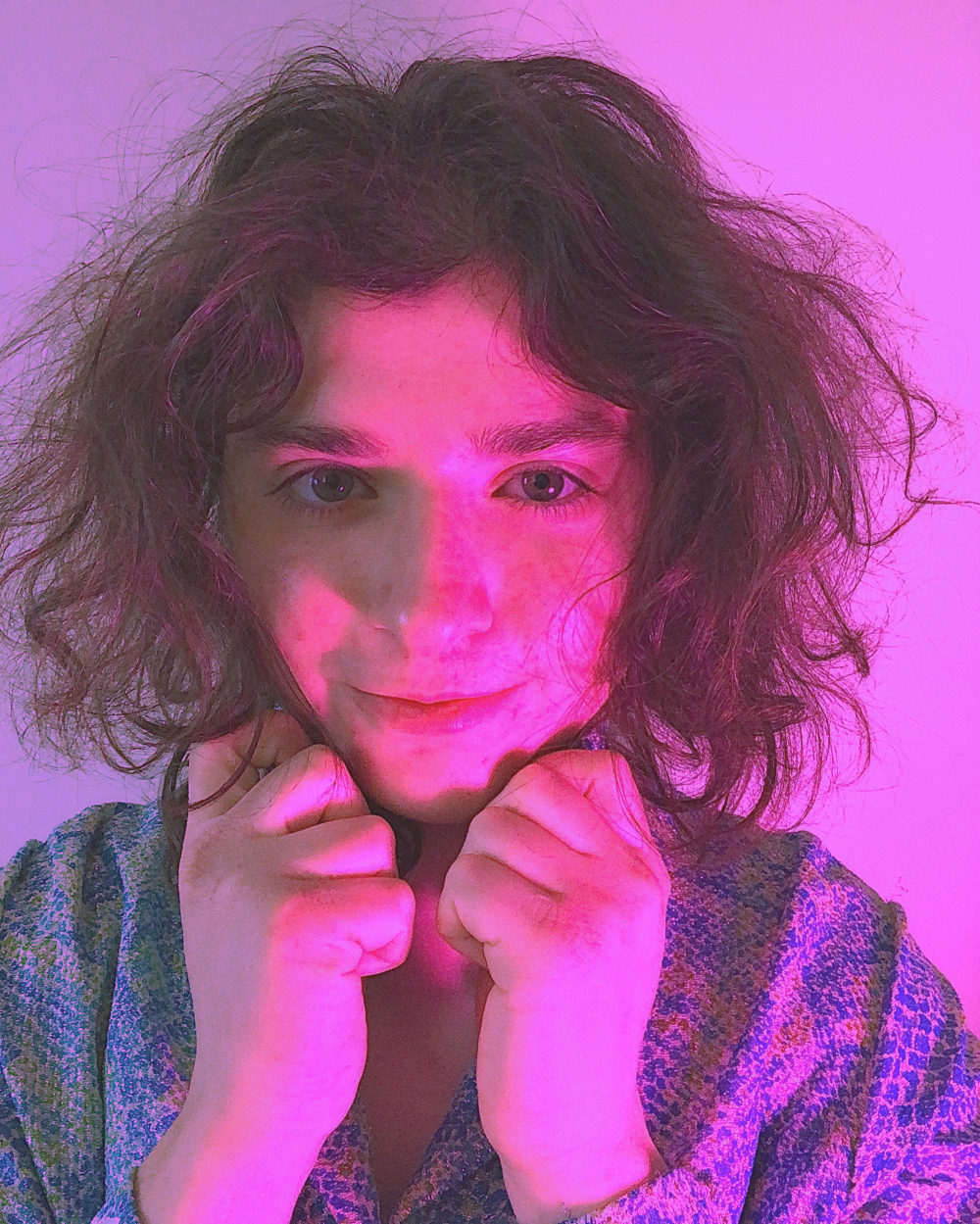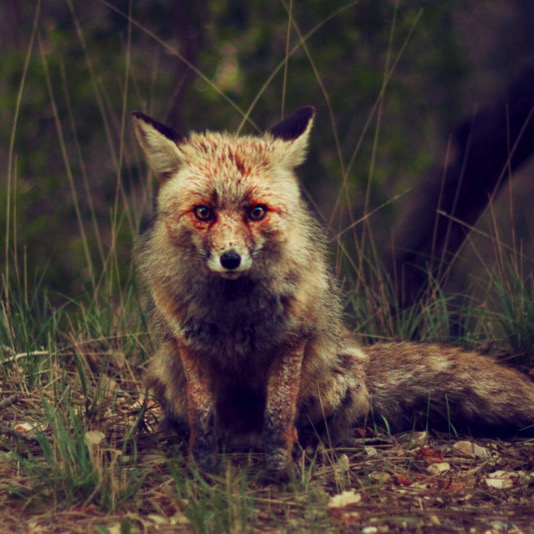
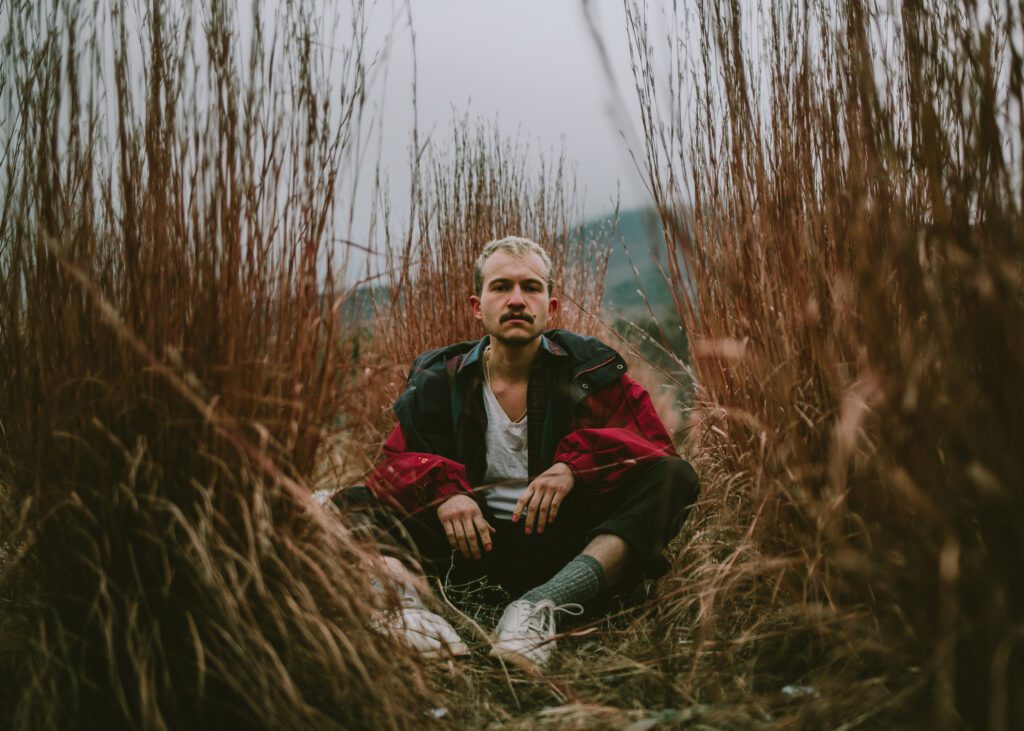
Izzy Heltai can be a bit impulsive. “I hate in-between spaces and I hate limbo and I hate non-concrete things,” he admits on a phone call with Audiofemme. Of course, over the past year, we’ve all found ourselves in pandemic limbo, unable to make any kind of plan at all. And Heltai was right there too, as lockdown set in – after living and playing music in Western Massachusetts for years, his lease was up, and he wasn’t sure to do. Leaning on that impulsivity as a cure for his anxiety, he moved back to Boston to live with his mom, but quickly realized that the natural landscape and the freedom of Western Mass was vital to his creativity and mental health. He returned as soon as he was able, and at the start of this year, began the process of recording a series of one-off singles, one of which, “My Old Friends,” arrived last week; today, Heltai premieres a lyric video for the song, which he says is essentially about “searching for a sense of home and physical space that feels good to you, where you feel comfortable.”
Over swirling keys, “My Old Friends” sees wanderlust setting in as Heltai learns to let go. It begins with a realization: “There’s a part of me that always wants the answers/I should just try living in the moment for a change.” By the track’s end, Heltai’s mindset is one of acceptance: “I’m just trying not to lose myself most days/I’m delusional if I think there’s an answer ’round the corner/If it’s there it’s miles away.” In a blush-colored puffy coat, Heltai dances along an isolated forest path, the barren trees and the camera his only audience. But as the viewer, it’s easy to get a sense of how carefree Heltai feels when he’s in his element, and that he doesn’t take himself as seriously as a simple read of the lyrics might suggest. “I’m really trying to be okay with being uncomfortable a little more, though it’s hard,” he says. “I think the song is grappling with that, and not making decisions just because I think a decision needs to be made.”
Along those lines, Heltai’s music is in the midst of an evolution as well. He released his debut LP Father in September 2020, a culmination of folk songs he’d written from his late teens through early twenties and had performed in mostly acoustic iterations in coffee shops and breweries, “wherever anyone would let me play music,” he says. “No one was listening ever; I don’t really know why I had this inclination to do it – I just loved playing songs for people.” Heltai finished writing the album in the summer of 2019, on a “glorified roadtrip” tour that took him through Wyoming and Colorado, where he slept in his car in Walmart parking lots and showered at Planet Fitness.
The album was recorded mostly live-to-tape by Heltai’s longtime collaborators – multi-instrumentalist Micah Katz-Zeiger, bassist and engineer Andy Cass, producer Max Shakun, and drummer Garrett Salazar – retaining a rootsy, roomy vibe as Heltai ruminates on his relationship to the past and future, to his family and friends, and to his identity as a trans man. Even in its more weighty, personal moments, Heltai speaks with a universal sensibility, and earmark of the folk traditions he was first attracted to when he started playing guitar and writing songs in earnest (around the age of 14, after his father took him to Newport Music Festival).
But “My Old Friends” – as well as “Day Plan,” a single Heltai released in February – is altogether different. For one thing, Heltai has expanded his sound in terms of genre, in the vein of indie artists like Andy Shauf and Del Water Gap. “I have been listening to more music, and more different types of music, than I ever have in my life and really being inspired by contemporary songwriters in the indie genre and really wanting to build that way more into my songs,” Heltai says. “It’s not a super intentional thing, it’s more an organic product of what I’ve been listening to – what is coming out right now and what’s exciting me in songwriting.”
Part of that comes from to having more downtime during the pandemic; living alone has been difficult at times for Heltai, but the upside has been a period of huge creative growth, particularly, he says, when it comes to “learning about production on my own and really getting obsessed with that over the summer. And learning how to be super meticulous when it comes to building songs and paying attention to each specific sound and instrument and what creates this amalgamation sonically.” Though he’s recording with the same team that worked on Father, they’re tracking instruments separately rather than playing live, honing in on the exact sonic references Heltai has laid out for each song. “Day Plan” and “My Old Friends” were recorded in January, and the band spent last weekend recording two more in the same fashion; these, along with another single Heltai says leans toward Modern Baseball’s brand of pop punk, will comprise a five-song EP he plans to release this summer, after putting them out as stand-alone singles over the next few months.
“It’s really cool going into the studio just thinking about singles and specific songs, instead of with an album in mind, because it allows us to be so particular and intentional about every sound,” Heltai says. “Every song has different references. And I don’t care about them really lining up in any sort of genre because I’m just gonna take every specific thing for what it is and get excited about that.”
Heltai’s approach to writing lyrics has also evolved in a way that’s evident on “My Old Friends,” with its plain-spoken sentiments couched in Heltai’s own ultra-specific context. “I’m really done with abstraction in my music. I think for a long time, especially as a young artist, I was trying to pander to universals in a way that led my lyrics to be abstract, trying to get at concepts that were big,” Heltai says. “What I’ve leaned into and what I love about songwriting is actually just writing about specific things in my life and allowing other people to tell me if they think they’re universal or they relate to them, instead of me trying to tell anyone what they should take away from my music.”
“Take me out to see the country/My old friends in Western Massachusetts know/It’s the only place I’ve ever called home,” Heltai sings, expressing a certain feeling of being hemmed in, but also, in a way, proudly repping the scene that’s essentially validated his work (like Cambridge folk venue Club Passim, the “first real place that ever took me seriously… brought me into this incredible community of local singer-songwriters… and are such champions for a lot of wonderful musicians in that area that are all now my dear dear friends,” Heltai says. “It feels like coming home every time I get to play there.”)
But Heltai’s favorite line in the song is perhaps even more specific: “I’ve been thinking ’bout my constant need to change/Every month it seems I’m wearing different outfits/And my fashion sense reflects my mental state.” Most of us do this to some extent, but for Heltai, there’s more to it; it’s born out of “this constant unrest, but also my need to be the most authentic me in the moment and be present with that,” Heltai says. Though the practice is presented in the song almost flippantly, there’s no question that Heltai’s trans identity plays into it. “I think about that all the time; for so long, I was told by the world that I could not be authentic in such a big way. Once I realized I had the tools to do that I became obsessed with finding what felt the most present and good in the moment whenever I could.”
In the lyric video, Heltai’s fashion choices were dictated more by warmth than anything, though. “I parked my car on the side of the road near what I’m sure was a state forest or some shit, just like a path in the woods, and it was freezing. I set up the camera on a tripod, and blasted the song for three hours straight through my car speakers and filmed a bunch of shit,” Heltai remembers. He got odd stares from passersby, and at the end of a very cold day thought, “I got nothing good, this was a waste of time, this must look ridiculous.” Fellow musician Sean Trishka, who also does design work, edited the footage down to a charming clip just shy of four minutes. “I know zero things about video, so thank God I had an editor, but also, I just did not realize how hard sending footage through the internet was,” Heltai laughs. “I was like, why is there a hundred gigabytes of footage and this takes eight hours to upload?” Luckily, Trishka lived close enough that Heltai was able to drop the SD card at his house.
Heltai plans to make lyric videos for each of the singles coming out this year, as he has with “Day Plan” and now, “My Old Friends,” inspired by a particular niche of DIY creators. “All these pop guys in LA have been making these weird videos, and I don’t know why but I really like watching them, so I’m like, okay there’s something kind of appealing to this,” Heltai says, citing Jeremy Zucker, Alexander 23, and Quinn XCII as examples. Based on their work, he decided, “I’m just gonna let whatever comes out come out. I was like, I’m doing lyric videos, what about doing a dancing video? I mean, I’m a terrible dancer, so I thought it was great.”
However silly Heltai may have looked to strangers who saw him filming, the end result offers a self-portrait of an artist who is open, confident, and at a creative zenith. “Obviously the pandemic was horrible and was also really hard for me mentally in a lot of ways, but I’ve never been happier creatively in my life; without this growth I really don’t know where my songs would be,” he says, adding that his ultimate goal is to “just be the most authentic person I can be.”
“My Old Friends” is an extension of that philosophy. “What I think you’re seeing show through here is me really trying to do that in my songwriting at this point, because that’s what I love in lyrics,” Heltai says. “I love when they’re fun and concrete, because it’s reflective of what life is to me. I’m not a serious person. I think so much of life is so hard for most people most of the time that you can’t really be that serious all the time. When you can have fun, just do it. I love having fun. But I also love thinking and growing and reflecting and changing.”
Follow Izzy Heltai on Instagram and Facebook for ongoing updates.

